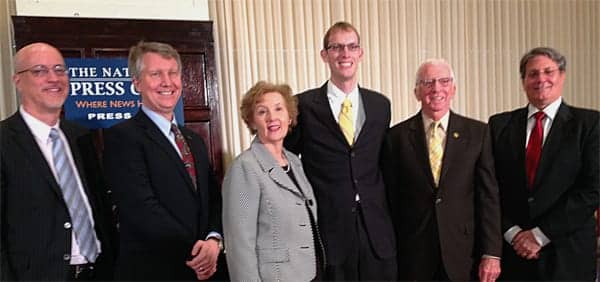According to an announcement from the Hearing Loss Association of America (HLAA), an initiative amongst five organizations has led to documents being filed with the US Department of Justice that help improve access to movies in US theaters for deaf and hard of hearing people.

From left: John Fithian (NATO, president & CEO); John Stanton (AG Bell, volunteer); Anna Gilmore Hall (Hearing Loss Association of America, executive director); Andrew Phillips (NAD, policy counsel);
I. King Jordan, Ph.D. (Gallaudet University, president emeritus, and ALDA); Randy Smith (Regal Entertainment Group, senior vice president, chief administrative officer & counsel)
The HLAA, along with the National Association of the Deaf (NAD), the Association of Late Deafened Adults (ALDA), and the Alexander Graham Bell Association for the Deaf and Hard of Hearing (AG Bell), recently met with representatives from the National Association of Theater Owners (NATO) to hammer out an agreement on movie captioning.
The meetings resulted in two documents being filed with the US Department of Justice in its rulemaking on movie access: the Joint Recommendations to the US Department of Justice and the Joint Voluntary Commitments on Closed Captioning and Video Description.
The set of recommendations to the DOJ to improve access to movies for deaf and hard of hearing patrons include:
- Closed captioning (CC) and audio description (AD) technologies are to be installed in all digital movie theater auditoriums nationwide.
- The joint plan establishes certain minimum closed captioning device requirements with a monitoring requirement. This flexible, market-responsive device scoping method will ensure access for all deaf and hard of hearing patrons and respond to actual consumer demand.
- The compliance period has been restructured to reflect reasonable timelines in delivery and installation of CC and AD systems.
In addition to these and other requirements regarding marketing, staff training, and equipment maintenance, the movie theater industry and the advocacy groups have committed to voluntary actions to expand access to movies, including:
- Encouraging movie distributors to provide CC and AD data files on all movies and trailers.
- Encouraging movie distributors to provide theaters with information on the availability of CC and AD technologies in advance of a film’s release so this information can be included in show time listings.
- Sharing information on areas with large deaf and hard of hearing populations, including schools, and conducting specific outreach to community groups.
- Encouraging theater operators to accommodate large group requests for either open captioned shows or large group requests for closed captioning devices, as long as they have advance notice to accommodate a group.
- Promoting the availability of closed captioning systems among members of HLAA and other consumer groups.
According to HLAA, this agreement represents a huge step forward for people who depend on text captioning to have full access to movies, and is likely to be welcome news for people who had given up going to the movies simply because they could no longer hear.
Source: HLAA



